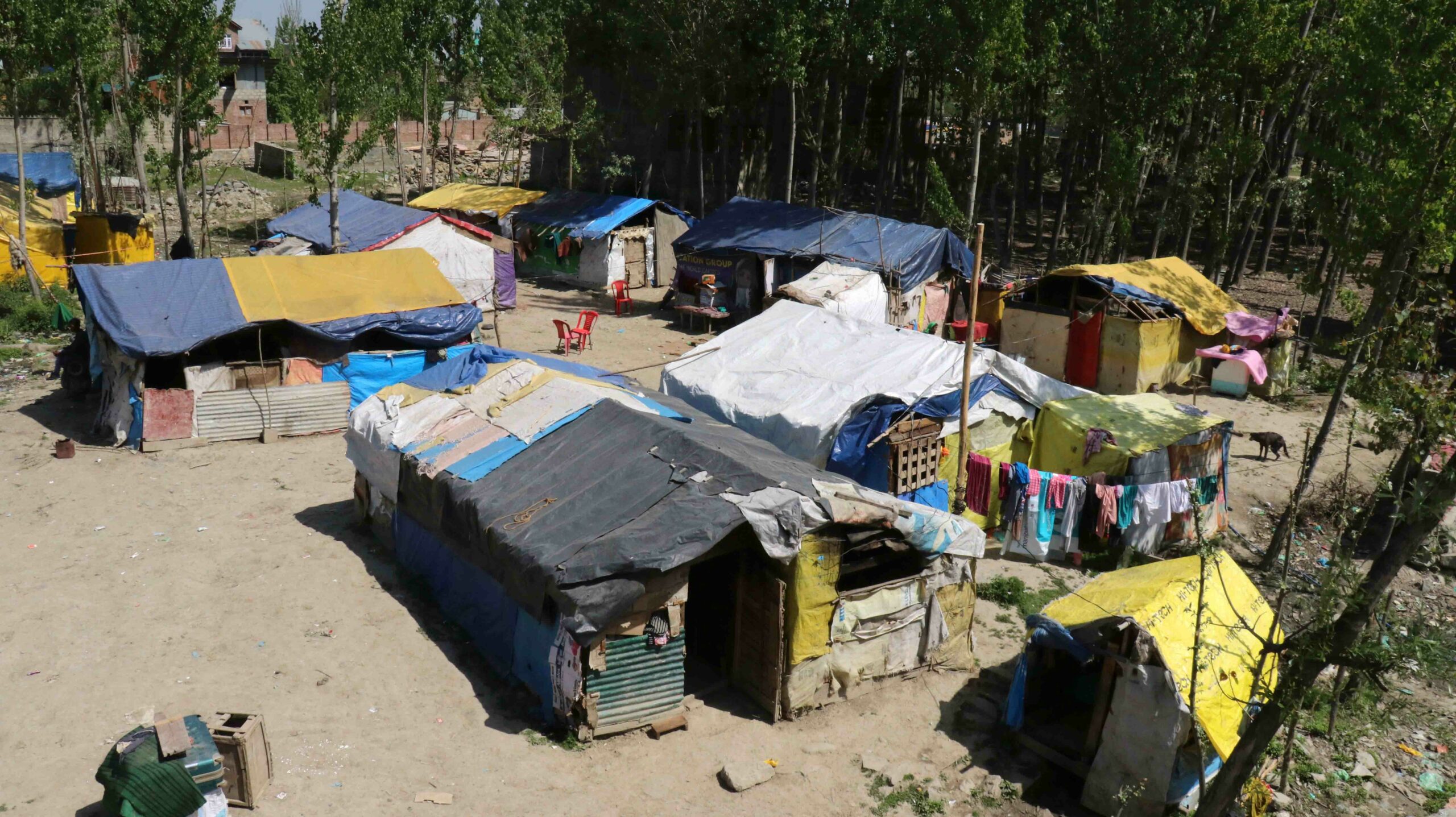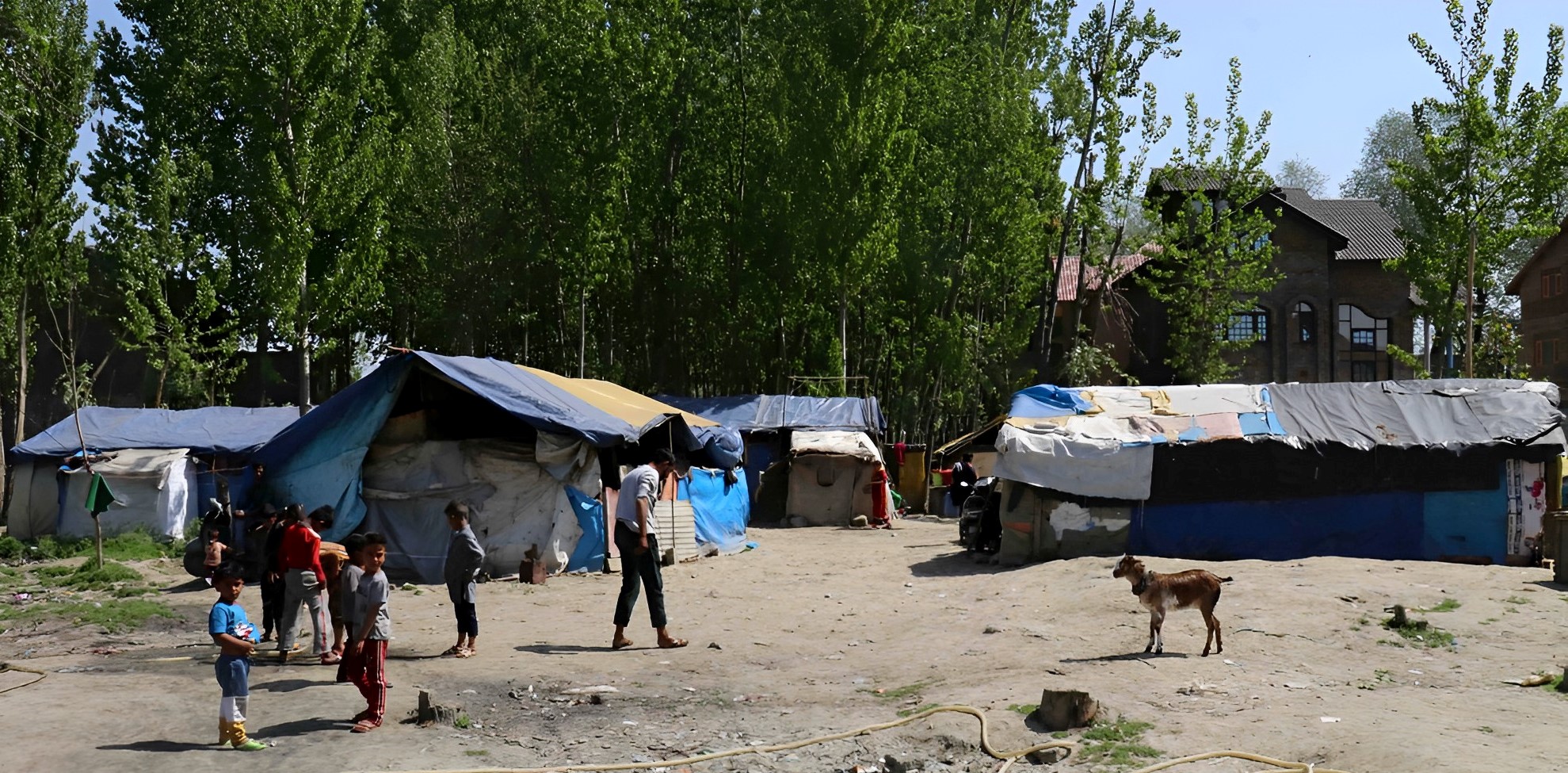Driven by poverty and the hunt for livelihoods, a group of Nagrota families is living near Batamaloo in a tented slum to make a living, reports Nida Mehraj

In the run-up to the G20 tourism-related meeting in May, the focus of the administration is on the smart city project. However, no policymaker is interested in looking at the outer circle of the city that is dominated by the slums. Now localities in Srinagar have two identities, one specific to the slums growing around them.
Tengpora is a thriving business address and has a number of good housing settlements. At the same time, it has a slump that is also known as Tengpora. It has around 16 families.
Most of the families in the Tengpora slum said they are basically from Nagrota in Jammu and have been living in Kashmir for the last 30 years. They said they came to earn their livelihood and eventually ended up living here.
Some of these families shifted to Tengpora from Batamaloo’s other locality, the Dhobi Mohalla, almost 12 years ago. “I used to first live in Batamaloo. I have lived there for only years, then I moved to JVC and then with time I came here,” Bilal Ahmed, 28, said.
No Basic Facilities
Slum life is obviously different and challenging. They live in ramshackle tent houses. They lack every basic facility. There are no toilets and no tap water. Even privacy is hugely compromised. Tents are the same as can be found anywhere else – a few rods having a thin sheet of plastic over it. Residents said their tents are the same as they earlier had in Nagrota, the area they belong to. Some of them even claimed their slum tents are much better than the ones they were living in back home.
“We don’t have toilets and have to go out in the open,” Rubeena, 27, said. “During our periods, it gets very difficult. We lack access to sanitary napkins and sometimes we get allergies.”
Most of the men of Tengpora slum sell socks. Their women work as maids to some of the people living around them. “We earn Rs 200 to Rs 300 a day, which is not enough for us, but we have to make ends meet,” said Rubeena.
Unlike men, life for women is challenging. They have to keep the meals ready for their men. They usually cook on the fuelwood-fired traditional hearth. “We do not buy wood as it is very expensive,” Rubeena said. “If a tree falls somewhere, we go and collect the wood and use it.”
Even men said that life is a major challenge. “We earn in the day and then only we eat in the evening,” Bilal said. “Sometimes we run out of fuel and sometimes out of food. This is a daily race to make some money to feed the family.”
Harsh Winters
During winter, these families suffer in extreme cold and go through various problems. “Our tents become our Siberia,” Bilal said. “The earnings go down during the winters and sometimes we can’t even light a fire to keep ourselves warm. We don’t even have enough bedding for winter, as nights are very cold.”
However, some families use the harsh winters to visit Jammu only to return in spring. “Families having very young kids or any elderly person prefer going to Jammu,” Shaheena Akhter, 26, said. “The cold can easily kill youngsters and elderly people.”
Tough Routine
Slum dwellers leave for work at 8 am and report back to the slum around 6 pm. Their children, in most cases, go to school.
“In our area, females mostly work as maids at other people’s homes and men mostly sell socks and few people do some other menial work,” Rubeena said. However, the slum has quite a few people staying back in tents to take care of their modest belongings.
Most children go to school but a few stay behind to help their families. “Both my parents leave for work in the morning and come back in the evening,” Tahira, 15, said. “There is no one to look after the household chores. We are six members in the family, so I left school two months back to look after the house.”
“When we leave for work in the morning, we are scared that a burglar can get into our tents,” Shaheena said. “The crisis is acute during winters when our kids are home and not in school.”
Tent Houses
These families live in tent houses where they adjust with six to seven members. “In these tents, we have enough space to sleep and sit, and a little space for our small kitchen area and where we keep our stock,” Shaheena said. “We feel satisfied with these tents as we have enough space where we can stay, and have a washroom to bath.”
These families have been living in slums for a very long time. They say they are happy that they have a roof over their heads. “We have to deal with certain problems here, but we are fine with it,” Bilal said.
Even the children of the slum dwellers are satisfied. “We feel cold here and get problems during rainfall as the area becomes very muddy, but still I think it is a good place and I love it,” Tahira said.“We were brought up here and we love it.”
What makes the Tengpora slum different is that the host localities around it have no grievance against them. They actually supplement each other. Besides, this slump – unlike all others, is not linked to a particular trade or profession. The people living in this slum are workers. While men work in the market, selling smaller items on carts, the women work either at their homes or help as maids to the people living around.

Generous Hosts
Residents of this slum said lot many people visit them with help, especially when the overall situation is bad. In fact, the person who owns the patch of land is not seeking any rent from the slum dwellers, apparently on compassionate grounds.
“Our neighbours help us a lot with whatever they can and other than them, the local Bait-ul-Maal sometimes help us,” Shaheena said. “I think the people of Kashmir are very generous as sometimes people come individually and help us with whatever they can. It can be groceries, food, clothes, blankets or any necessary things.”
Her hard work and help have actually changed Shaheena’s household. “I have sent my three children to a private school to study,” she said. “The principal of that school is very nice. At times, she doesn’t take fees from us and gives the notebooks to my children for free. Sometimes, she even helps us personally with household stuff.”
Shaheena said the generous hosts have been the real strength of the slum. “One of our community members had blood cancer and we couldn’t afford to pay his hospital fees but our neighbours helped a lot during that time and paid his hospital bills,” Shaheena said.
During lockdown and curfew, their neighbours helped them, throughout. “A few people used to come and help us by giving some groceries such as rice, vegetables, flour and oil etc,” Rubeena said. “That was purely on humanitarian grounds because our men were unable to work as the entire markets were closed.”















